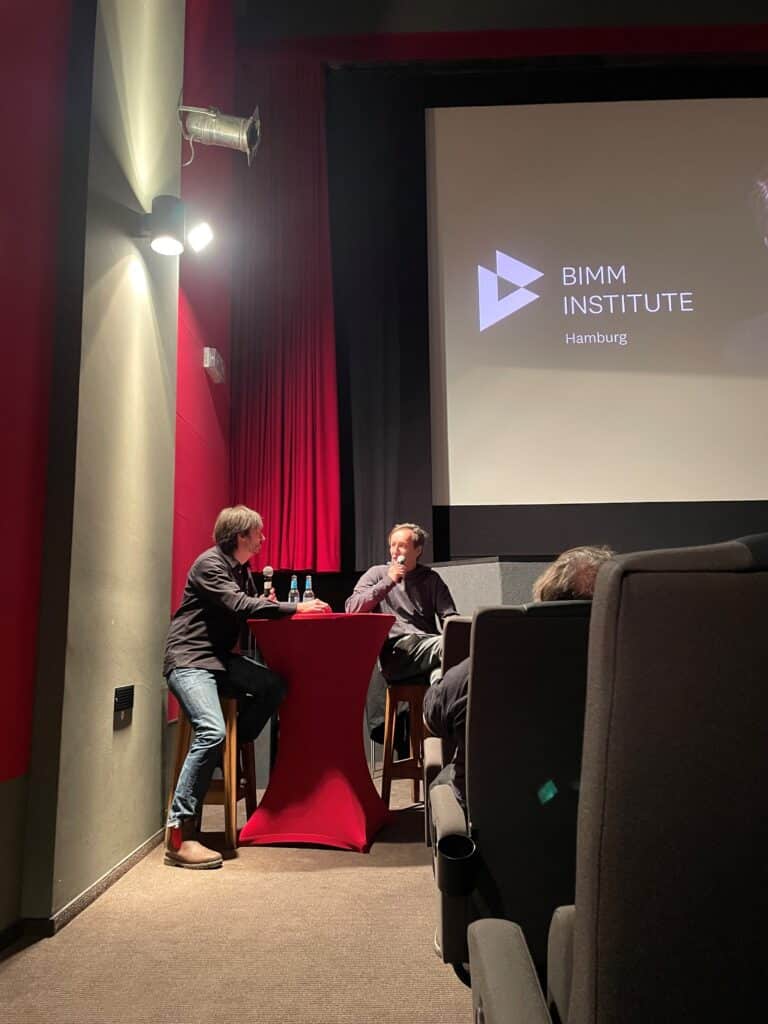BIMM University masterclass with 2023 Oscar winning film composer Volker Bertelmann
Two weeks ago, we were excited to host a special off-site film screening and masterclass with Volker Bertelmann (who also goes by the artist name Hauschka) an internationally acclaimed pianist, composer, and experimental musician! One of Volker’s most recent projects was as composer for the 2022 film All Quiet on the Western Front.
Since this masterclass, the film has swept up dozens of awards including several BAFTAs (British Academy Film & Television Awards), and most recently, picked up 4 awards at the Oscars. Volker’s work was recognised here with the film winning Best Original Score.
Before our masterclass interview and Q&A with Volker, students watched a screening of the film he scored called ‘All Quiet on the Western Front’ (2022). This film tells the story of a young German soldier on the Western Front of World War I. Oscar nominated in 2023 for Best Original Score for All Quiet on the Western Front, and just last month won the British Academy Film & Television Awards, or BAFTA Award for Best Original Score.
Before becoming known as an Oscar-winning composer, producer and pianist, Volker Bertelmann has long been keen to absorb countless influences and push his creative limits, experimenting at an early age already with just how different he could make the piano sound through preparations.
As the composer and pianist Hauschka, the essence of his work lies in constantly challenging himself to new musical experimentation. It was when he started his musical journey on the piano that someone told him: “Your piano playing sounds like electronic music”.
After watching the film, students got to ask Volker questions about his approach to composing for film and his own music and experimentation. When asked about his approach to improvisation he says he’s “filling folders up with spontaneous ideas”.
“Experimentation means you have no fear of being watched from the outside where someone is thinking ‘what is he doing’”. Volker Bertelmann
He also talked about how the score for “All Quiet on the Western Front” developed and how he worked with the director to come up with this unique piece of film music. Volker explains how it was important for the director to have various things represented in the score and mentions the director saying:
“ I want music for Paul Bäumer’s stomach. I want music that describes his feelings in the trenches. Something that is restless or like a war machine – that kind of feeling. I also want a snare drum player that can’t play the snare. So, I want snare hits that are weird and off-time.”
Present throughout the film is the leitmotif of three notes that repeat and create anticipation. Noticeable is also the intentional use of silence in the film to give power to the actors’ scenes. When talking about the score he mentions that he did not want to give the film “the Hollywood treatment” and didn’t want the soldiers to appear heroic, which is why he came up with this unique score.
We also caught up with students and asked them what they thought of the film and the music specifically:
“I thought it was very strong. When I heard the 3-notes-motif for the first time I though it’s very different and bold. And by repeating that in quiet moments and by using the same melody it came through very strong. And I liked that very much. In general, the film was very impressive.”
Elena Storl, Vocals
“It was creepy. It made me feel uncomfortable which reminds me of a lot of modern music compositions for film. And it sounds pretty contemporary. So generally, very good.”
Elliot Black, Electronic Music Production
“The most interesting thing to me was the extensive use of silence in the music which really helped to elevate the actor’s feeling. And there was motivic development in the score, which was fantastic in my opinion.”
Max Bösler, Music Production
“I thought the masterclass was really cool. It was very inspiring to hear how he prepares the instruments to create new sounds.”
Anna Hirschgänger, Vocals Graduate
We also caught up with Music Production lecturer Yak Bondy and asked him about his opinion on the score:
“In a way, I was dreading that it would be given the Hollywood treatment with full on strings and the glory moments and the hero and all that. (…) And I really liked the way he felt like he must not give any particular character or an emotion of fighting as a whole a specific theme.
Within the film, the very first time any music came in was this leitmotif and it really woke you up. Until then you have no idea – will there be strings, will there be a voice, will there be a banjo. And then that. It was completely unusual. Jumping 120 minutes, I think we were all used to that being part of the overall palette. So that makes sense.”
Yak Bondy, Music Production Lecturer
We thank Volker Bertelmann for sharing his insights on film composing and taking the time to answer our students’ questions!













